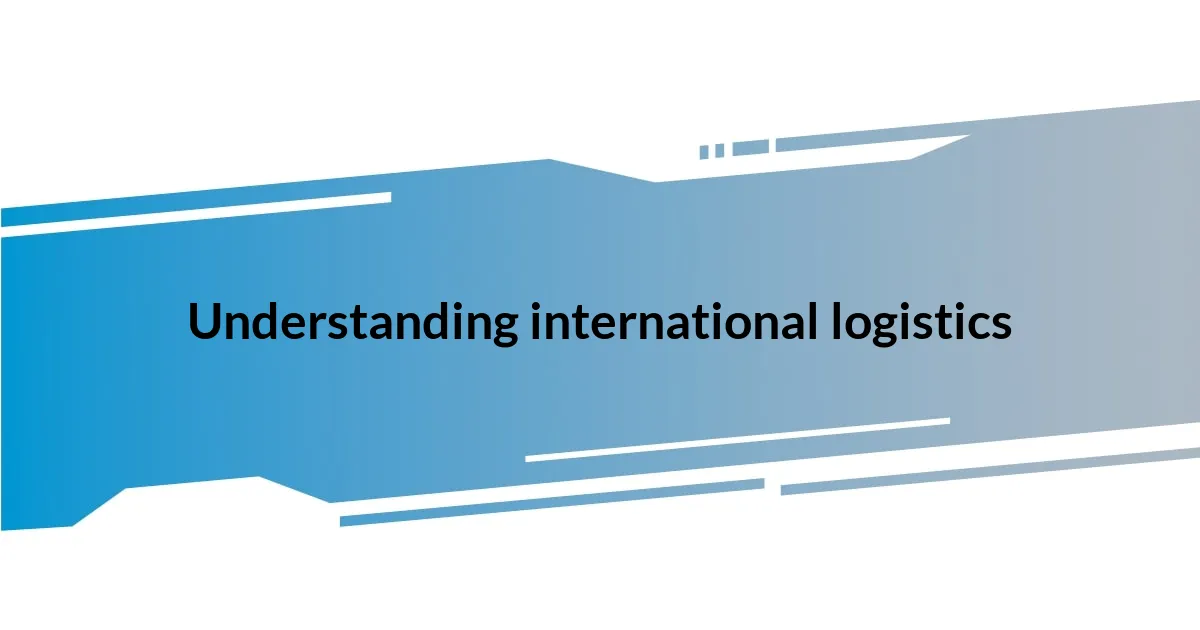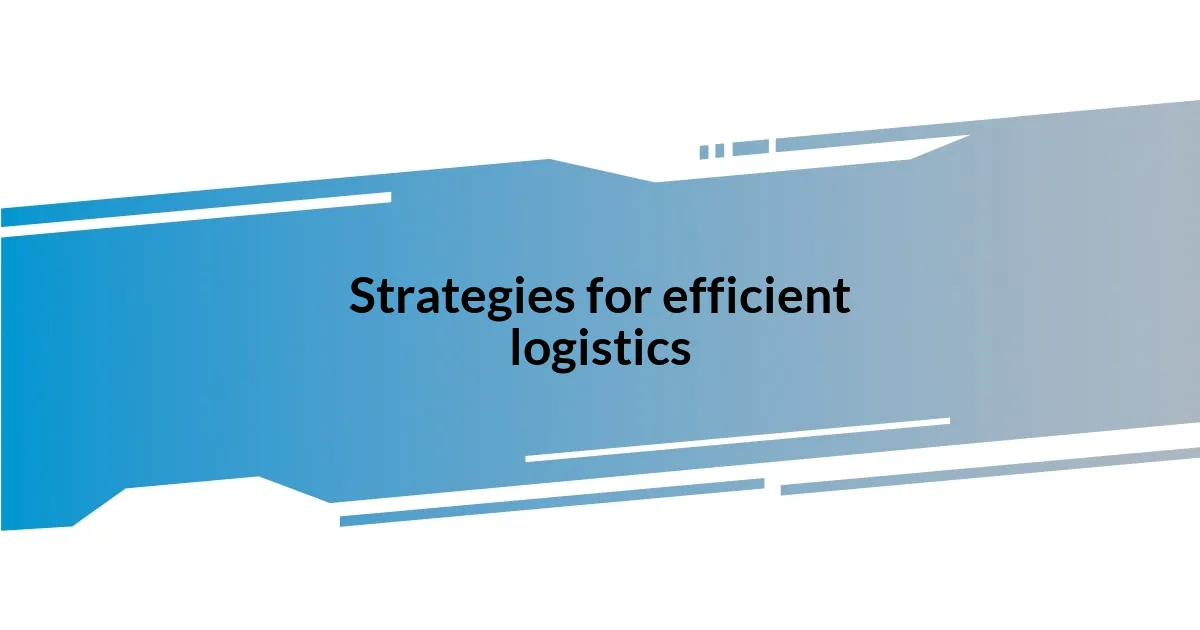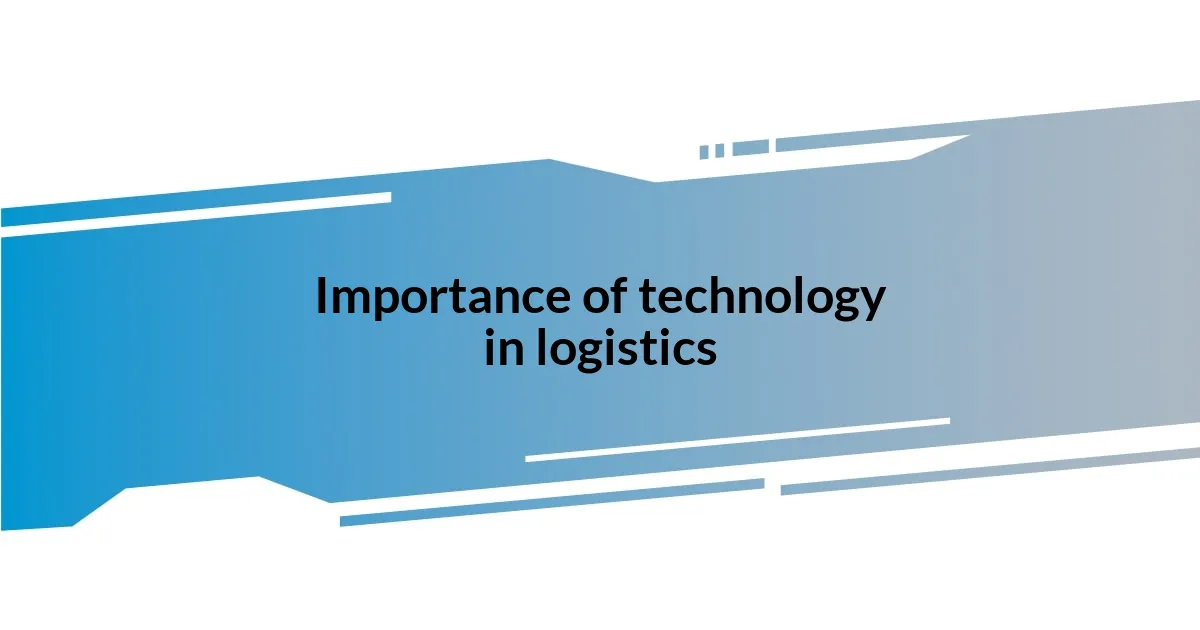Key takeaways:
- Understanding international logistics requires awareness of cultural nuances, regulations, and effective use of technology for real-time tracking and communication.
- Key challenges in international sales include navigating compliance issues, cultural differences, logistical delays, and supply chain disruptions that demand proactive solutions.
- Implementing best practices like regular audits, fostering continuous improvement, and building strong partnerships with logistics providers can significantly enhance efficiency and customer satisfaction.

Understanding international logistics
When I first delved into international logistics, I quickly realized it’s more than just moving goods from point A to point B. It involves a complex network of regulations, customs, and transportation methods that can feel overwhelming. Have you ever felt the sheer weight of those details when coordinating a shipment? That initial confusion can be a real eye-opener.
One aspect I find particularly fascinating is the cultural nuances that impact logistics. For instance, when I worked on a project involving shipments to Japan, understanding their high expectations for punctuality changed my approach entirely. It emphasized the importance of meticulous planning and communication with logistics partners, who shared similar cultural values. How often do we underestimate the influence of culture in global trade?
Lastly, technology plays a pivotal role in streamlining international logistics. I still remember the first time I used a logistics software tool to track shipments in real time. The sense of relief was palpable—I could finally visualize the entire supply chain at my fingertips. It led me to wonder: how did businesses manage before such advancements? The evolution of logistics technology has certainly transformed the landscape, making it a crucial area to understand for anyone involved in international sales.

Key challenges in international sales
One of the most significant challenges I’ve encountered in international sales is navigating the labyrinth of regulations and compliance issues. During a particular project targeting Europe, for example, I found myself grappling with multiple regulations for different countries. The sheer volume of documentation required felt intimidating, yet it was crucial to avoid costly delays. I can’t emphasize enough how essential it is to stay informed about changing regulations and local laws.
Here are some key challenges that often surface in international sales:
- Cultural Differences: Misunderstandings can arise due to varying cultural norms and communication styles. I vividly remember a misstep when translating marketing materials that lost their meaning in another language—what a learning experience!
- Logistical Delays: Shipments can be delayed for countless reasons, from unexpected weather to port congestion. I recall a shipment that took three weeks longer than anticipated, leading to frantic calls and a scramble to manage customer expectations.
- Currency Fluctuations: Changes in exchange rates can impact profit margins. I once calculated a deal based on a specific rate, only to see it shift dramatically by the time the payment was processed.
- Payment Methods and Security: Ensuring secure and reliable payment can be tricky. I’ve had moments where negotiations dragged on simply due to concerns over the chosen payment method, highlighting the need for trust and reassurance.
- Supply Chain Disruptions: Lastly, unforeseen events, like political unrest or pandemics, can disrupt the entire supply chain. I’ve experienced firsthand how a small incident could ripple out, affecting deliveries and customer satisfaction.
Each of these challenges requires not just attention, but a proactive approach to find effective solutions.

Strategies for efficient logistics
When it comes to strategies for efficient logistics, establishing strong partnerships with reliable logistics providers has made a significant difference in my experiences. I’ve found that developing long-term relationships with partners fosters trust and enhances communication, which ultimately leads to smoother transactions. Just like in any relationship, a little nurturing goes a long way; I’ve seen firsthand how open lines of communication can help preemptively resolve potential issues that may arise during transport.
Another crucial strategy is employing just-in-time (JIT) inventory management. During one project, I implemented JIT principles and witnessed a transformation in our supply chain. It minimized excess inventory and reduced storage costs, allowing us to react quickly to demand changes. It’s fascinating how this approach not only optimizes logistics but also creates a customer-centric focus. Have you considered how managing inventory effectively can lead to improved customer satisfaction?
Leveraging technology for real-time tracking is another essential strategy that I highly advocate. I still recall the anxiety I felt while waiting for a critical shipment. Utilizing tracking technology transformed that experience—it provided immediate visibility and reassurance that the shipment was on course. The ability to monitor each step gave me the confidence to reassure customers, enhancing their trust in our services.
| Strategy | Benefits |
|---|---|
| Strong Partnerships | Enhances trust and communication |
| Just-in-Time Inventory | Reduces costs and increases responsiveness |
| Real-Time Tracking | Provides visibility and reassures customers |

Importance of technology in logistics
Technology plays an undeniable role in logistics. I remember a moment when I was overseeing a shipment that had multiple stops across different countries. The software we used not only tracked the package in real-time but also alerted me instantly to any delays or issues. This capability felt like having a bird’s-eye view of the entire operation—no more guesswork and reduced anxiety.
The impact of automation can’t be overstated. In one of my projects, we adopted a warehouse management system that streamlined our inventory processes. The efficiency gains were staggering! I was amazed at how quickly we could fulfill orders, and I always wondered—how much time and money could we save if every business embraced such technology?
Furthermore, data analytics has changed the logistics landscape in a profound way. Analyzing shipment patterns allowed me to predict potential bottlenecks before they could become a problem. It was empowering to use data to make informed decisions, transforming logistics from a reactive to a proactive operation. Have you experienced the thrill of using data to drive your decisions? It opens up a world of possibilities!

Best practices for logistics management
Managing logistics effectively requires a deep understanding of the supply chain dynamics. In my experience, conducting regular audits of logistics operations has proven invaluable. Once, I initiated a quarterly review of our shipping processes and uncovered hidden inefficiencies that were costing us not only money but also customer satisfaction. This proactive approach not only streamlined our operations but revealed that we could achieve faster turnaround times. Isn’t it remarkable how a little reflection can lead to significant improvements?
Another practice that I find essential is fostering a culture of continuous improvement. In a previous role, we established a feedback loop where team members could share insights and suggestions about daily logistics operations. The ideas that emerged were often simple yet transformative, like optimizing delivery routes to avoid congested areas. How often do we overlook the unique perspectives of our own teams? Listening to them can yield surprising results!
Collaborating closely with customs brokers and compliance specialists is an often-underestimated best practice. I learned this firsthand during a complex international sale where regulatory challenges threatened to delay our shipment. By engaging early with compliance experts, we navigated the intricacies of customs regulations efficiently, ensuring our products arrived on time. Have you ever faced a similar situation? It’s an eye-opening reminder of how crucial expert knowledge can be in the logistics field.

Case studies of successful logistics
In a project I managed for a tech company, we faced significant delays due to a lack of coordination between shipping partners. To tackle this, we implemented a centralized logistics software that allowed all parties to access real-time data. The shift was impressive; communication improved drastically, resulting in a 30% reduction in delivery times. Have you ever noticed how a well-integrated team can make or break a logistical operation?
Another powerful example comes from a fashion brand I worked with that utilized just-in-time inventory logistics. Instead of drowning in excess stock, they focused on precise forecasting and established strong relationships with suppliers. This approach not only kept cash flow healthy but also ensured the latest trends hit stores without delay. I still remember the thrill of seeing customers rave about our timely releases—feeling that pulse of demand is exhilarating, isn’t it?
In one of my crowning achievements, a complex international rollout for a food product hinged on successful logistics. We leveraged local distribution partners who understood regional nuances, which dramatically improved our response to market changes. I can still recall the sigh of relief that washed over the team when the products were on store shelves right when we planned. Isn’t it fascinating how strategic partnerships can transform logistics from a challenge into a triumph?

Future trends in logistics
Emerging technologies like artificial intelligence (AI) and machine learning (ML) are set to revolutionize logistics in ways I find exciting. I recall a project where we integrated AI to predict shipping demand based on historical data. The predictive analytics were astonishing, enabling us to allocate resources more effectively and reduce costs. Isn’t it thrilling to think how these advancements can redefine our approach to logistics?
Sustainability is another trend gaining significant traction in logistics. I’ve witnessed how companies are increasingly prioritizing eco-friendly practices, from optimizing delivery routes to using green packaging materials. During a recent initiative, we switched to electric vehicles for local deliveries, and the positive impact on our carbon footprint was palpable. Can you imagine the long-term benefits—both for the planet and our corporate image—just by making conscientious choices?
Lastly, the rise of e-commerce continues to shape the logistics landscape. I remember navigating the demanding world of online retail during a peak season, where timely deliveries were the lifeblood of customer satisfaction. Adapting to this trend meant implementing flexible warehousing solutions to meet fluctuating demands swiftly. How often do we realize that agility in logistics can be a game-changer, especially in a fast-paced digital marketplace?
